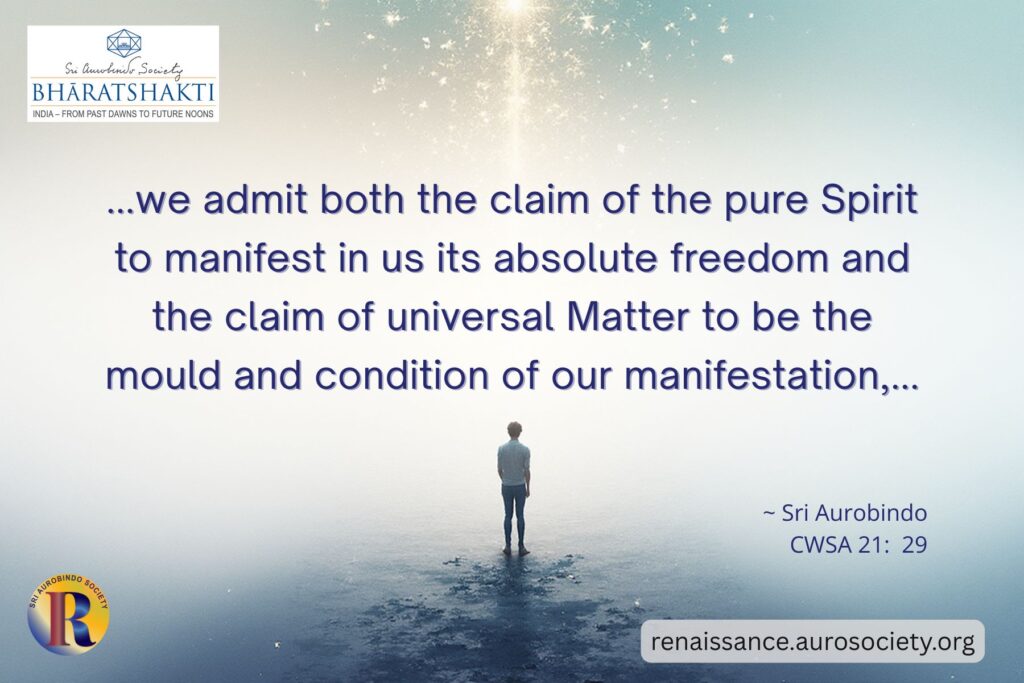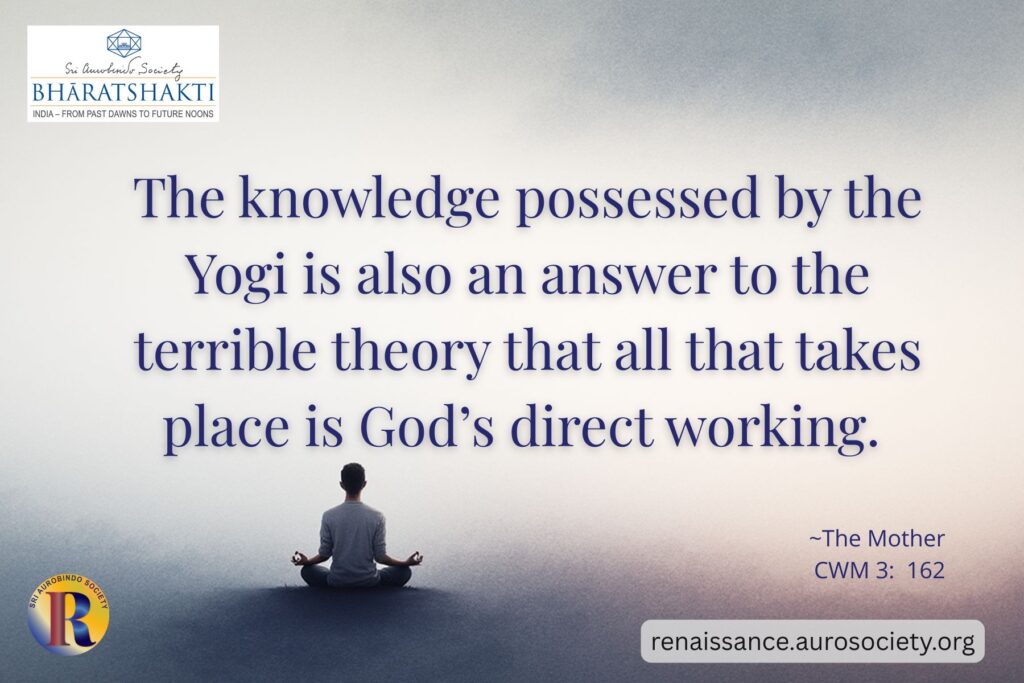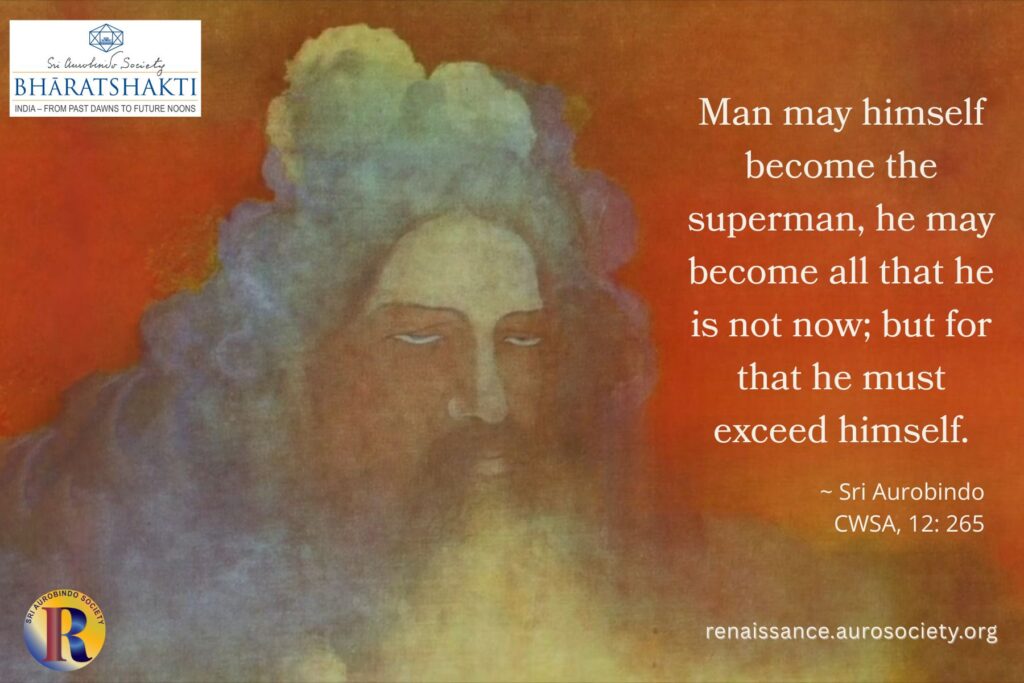Vol. III, Issue 6
Author: The Mother
Editor’s note: We feature an excerpt from a conversation where the Mother explains two of Sri Aurobindo’s phrases – namely, “strong immobility of an immortal spirit” and “the equality of soul”. One knows the tremendous power of immobility only when one becomes conscious of the immortal spirit.
In the second part of this conversation, the Mother explains perfect equality of the soul. To have this equality of the soul requires one to know that everything is an expression of the divine Will. But it also requires at the same time to also adopt that there is a will higher than that of man which wants things to progress.

Strong Immobility of an Immortal Spirit
Question: Sweet Mother, I don’t understand “the strong immobility of an immortal spirit”.
The Mother: What is it you don’t understand? That an immortal spirit has a strong immobility? It says what it means. An immortal spirit is necessarily immobile and strong, by the very fact of its being immortal.
Question: But then Sri Aurobindo says about the Gita: “Not the mind’s control of vital impulse is its rule, but the strong immobility of an immortal spirit.”
The Mother: [. . .] He says, “The Gita… aims at something absolute, unmitigated, unpromising, a turn, an attitude that will change the whole poise of the soul. Not the mind’s control of vital impulse is its rule, but the strong immobility of an immortal spirit.” This is as clear as daylight.
The Gita demands the strong immobility of an immortal spirit—all the rest is secondary. What the Gita wants is that the spirit should be conscious of its immortality and thus have a strong immobility.
For this is a fact, it’s like that. When the spirit is conscious of immortality, it becomes an immobility all made of strength. Immobility—that is to say, it doesn’t move any longer, but it is a strong immobility, it is not an immobility of inertia or impotence; it is a strong immobility which is a basis for action, that is, all one does founds itself upon this powerful—all-powerful—immobility of the spirit that is immortal.
But you see, there is no explanation which can give you that; you must have the experience. As long as one has not had the experience, one can’t understand what this means. . . And it is the same for everything: the head, the little brain, cannot understand. The minute one has the experience, one understands—not before. One may have a sort of imaginative idea, but this is not understanding. To understand, one must live it.
When you become conscious of your immortal spirit, you will know what its strong immobility is—but not before. Otherwise, these are mere words.
You don’t understand how one can be immobile and strong at the same time, is that what is bothering you? Well, I reply that the greatest strength is in immobility. That is the sovereign power. And there is a very small superficial application of this which perhaps you will understand.
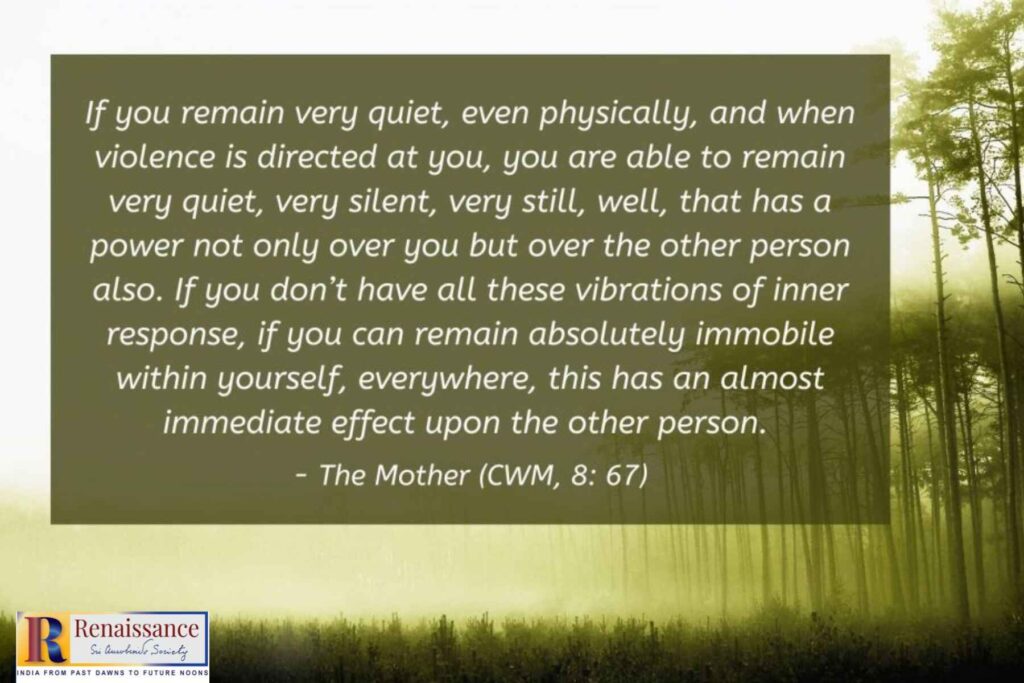
Someone comes and insults you or says unpleasant things to you; and if you begin to vibrate in unison with this anger or this ill-will, you feel quite weak and powerless and usually you make a fool of yourself. But if you manage to keep within yourself, especially in your head, a complete immobility which refuses to receive these vibrations, then at the same time you feel a great strength, and the other person cannot disturb you.
If you remain very quiet, even physically, and when violence is directed at you, you are able to remain very quiet, very silent, very still, well, that has a power not only over you but over the other person also. If you don’t have all these vibrations of inner response, if you can remain absolutely immobile within yourself, everywhere, this has an almost immediate effect upon the other person.
That gives you an idea of the power of immobility. And it is a very common fact which can occur every day; it is not a great event of spiritual life, it is something of the outer, material life.
There is a tremendous power in immobility: mental immobility, sensorial immobility, physical immobility.
If you can remain like a wall, absolutely motionless, everything the other person sends you will immediately fall back upon him. And it has an immediate action. It can stop the arm of the assassin, you understand, it has that strength. Only, one must not just appear to be immobile and yet be boiling inside! That’s not what I mean. I mean an integral immobility.
Perfect Equality of Soul and Progress
Question: Mother, is this the same as the equality of soul Sri Aurobindo has spoken about?
The Mother: Equality of soul is a way. It is a means, it is a way—it can be a goal also. But it is not the consummation.
For example, there are those who say, who profess that everything that happens is the expression of the divine Will. . ., there is an entire way of looking at life, understanding life, which is like that, which says, “All that is, the world as it is, all that happens, is the expression of the divine Will; therefore wisdom wants us, if we want to be in relation with the Divine, to accept without flinching and without the slightest emotion or reaction all that happens, since it is the expression of the divine Will, and it is understood that we should bow down before it.”
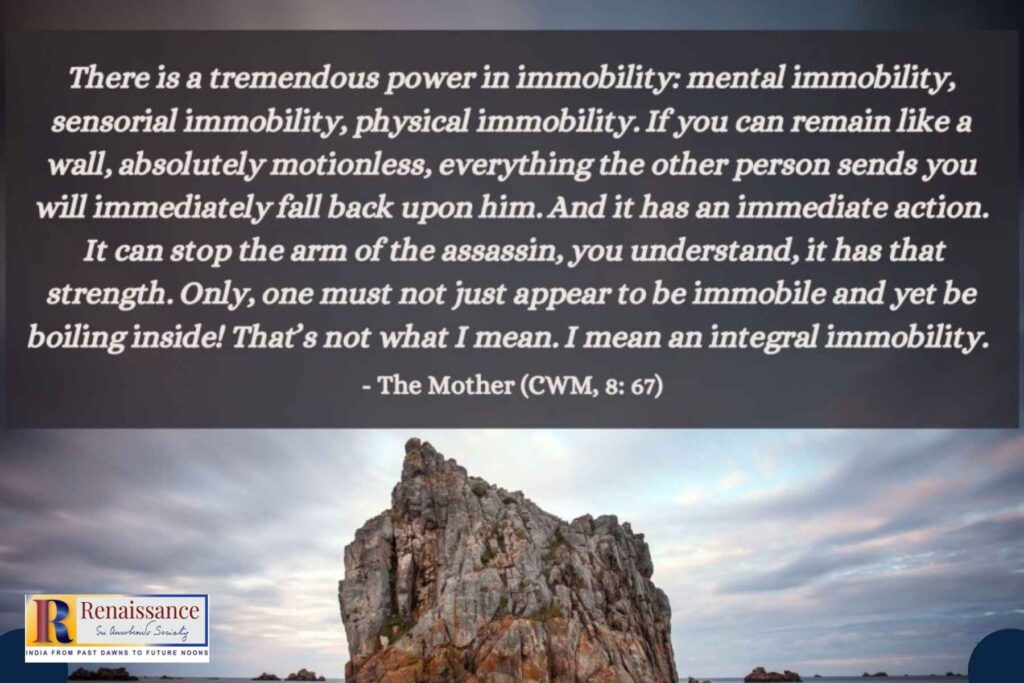
This is a conception which tends precisely to help people to acquire this equality of soul.
But if you adopt this idea without adopting its opposite and making a synthesis of the two, well, naturally, you have only to sit through life and do nothing—or, in any case, never try to make the world progress.
I remember having read in a class, before our present class started. . . I read a book by Anatole France, who had a very subtle wit—I think it was Le Livre de Jerome Coignard but I am not absolutely sure—where he says that men would be perfectly happy if they were not so anxious to improve life. I am not quoting the exact words but the idea.
Unhappiness begins with this will to make men and things better!. . . (Mother laughs) That is his way of saying exactly the same thing I was just telling you in another form.
If you want to be peaceful, happy, always satisfied, to have perfect equality of soul, you must tell yourself, “Things are as they should be,” and if you are religious you should tell yourself, “They are as they should be because they are the expression of the divine Will”, and we have only one thing to do, that is to accept them as they are and be very quiet, because it is better to be quiet than to be restless.
He turns the thing round and puts it in another way; he says life is very comfortable and very tolerable and very acceptable, if men don’t begin to wish that it should be different. And the minute they are not happy, naturally nobody is happy! Since they find that it is not what it should be, well, they begin to be unhappy—and others too.
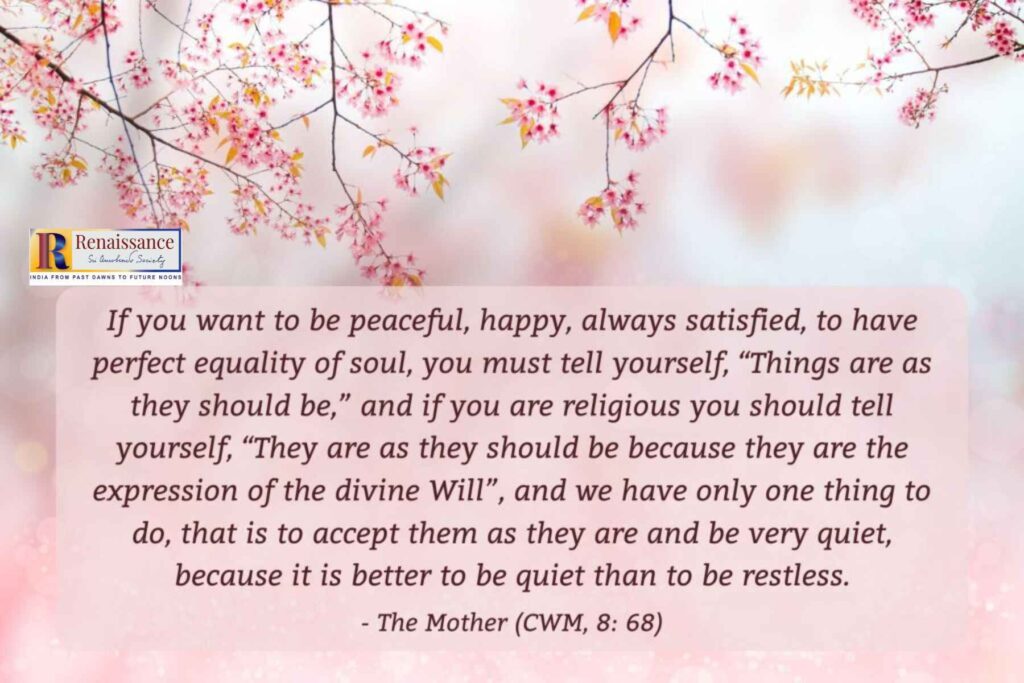
But if everyone had the good sense to say, “Things are as they should be; one dies because one has to die, and one is ill because one has to be ill, one is separated from those one loves because one has to be separated, and then, etc… and one is in poverty because one has to be poor, one…”, you know, there is no end to it.
Well, if completely, totally, one says, “Things are as they should be”, it makes no sense to grieve or to revolt, it’s foolish! Ah! one must be logical. So we say that misery begins with the will to make things better than they are. Why do you not want to be ill when you are ill? You are much more ill when, being ill, you don’t want to be ill, than if you tell yourself, “All right, it is God’s Will, I accept my illness!” At least you are quiet that helps you to recover, perhaps….
And poor people—why do they want to be rich? And people who lose their children or their parents—why don’t they want it to be like that? If everybody wanted things to be as they are, everybody would be happy.
This is one point of view. Only it happens that perhaps—perhaps, the divine Will is not quite like that.
And perhaps it is as in that story—you all know the story of the elephant and its mahout?—the elephant, its mahout and the Brahmin on the road who refused to get out of the way of the elephant and, when the mahout told him, “Go away”, he replied, “No, God in me wants to stay here”, and the mahout answered, “Pardon me, but God in me tells you to go away!”
So the reply to Anatole France is perhaps just this that there is a will higher than that of man which wants things to change. And so there is nothing to do but obey and make them change.
~ The Mother (CWM, 8: 66-71)

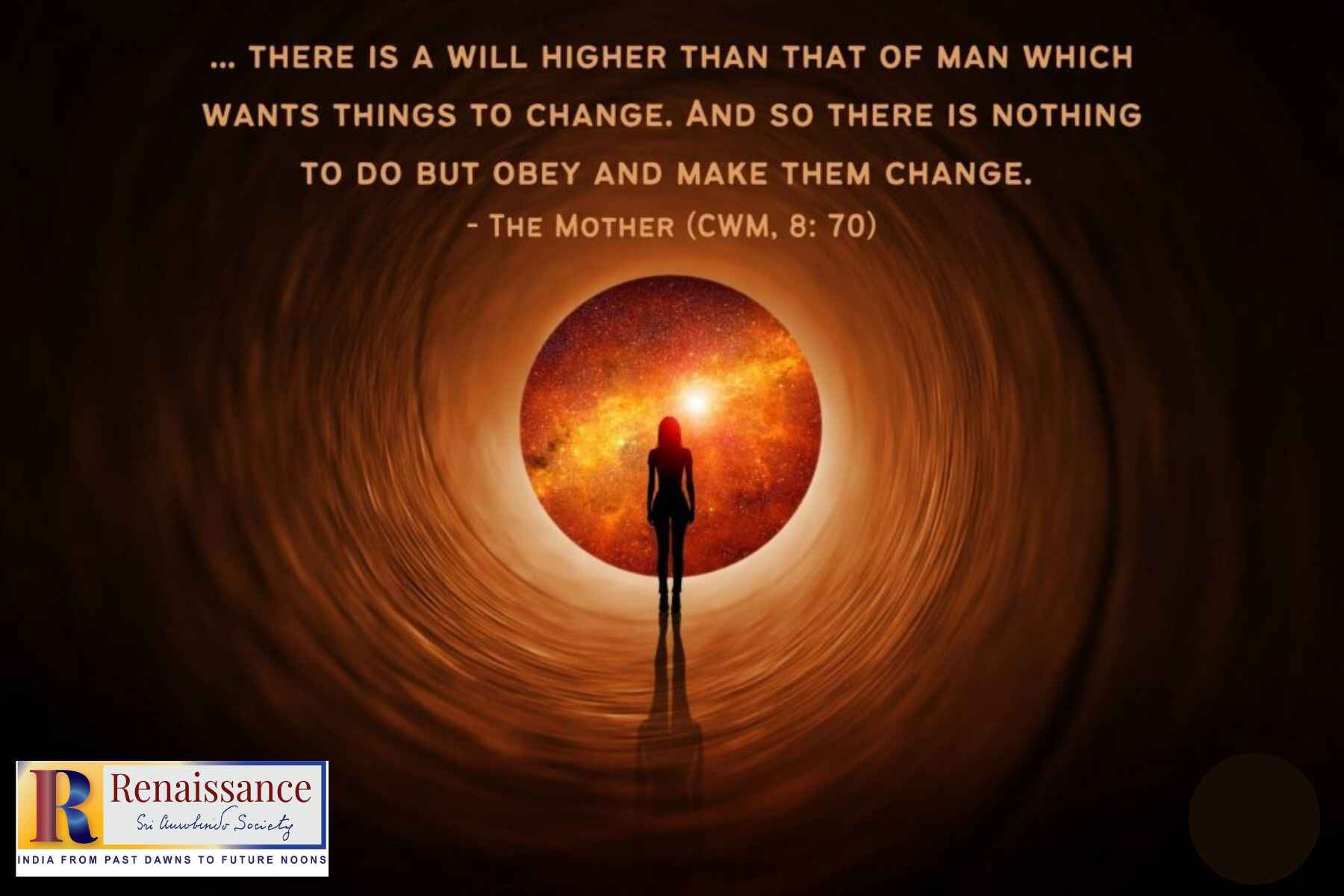

Read:
What is Yogic Samatā?: Sri Aurobindo Explains
~ Design: Raamkumar

